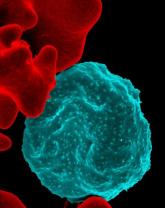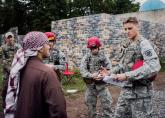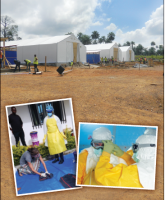Article

Can we eradicate malaria by 2050?
A Lancet Commission report details a series of modeled projections that could point the way.
David Brown is a Physician Assistant in the Urology Department at the VA Salt Lake City Health Care System and a Lieutenant Colonel in the Utah Air National Guard; Spencer Smith is an Emergency Department Physician at the University of Utah Hospital in Salt Lake City and a Major in the Utah Air National Guard. Mohamed Chibi is the Head of the Logistics Division at the Mohammed V Military Hospital in Rabat, Morocco and a Lieutenant Colonel in the Moroccan military. Nadia Hassani is a Health Care Supervisor in Emergency and Sports Medicine at the Ministry of Health in Rabat. Raymond Searles is an Assistant Professor of Nursing at Salt Lake Community College and a Captain in the Utah Air National Guard. Correspondence: David B. Brown (davidbillingsbrown@ gmail.com)
Author disclosures
The authors report no actual or potential conflicts of interest with regard to this article.
Disclaimer
The opinions expressed herein are those of the authors and do not necessarily reflect those of Federal Practitioner, Frontline Medical Communications Inc., the Utah National Guard, the US Government, or any of its agencies.
Patients can overwhelm hospitals in a disaster when need exceeds resources. In 1996, Mallonee reported that at least 67% of the patients who sought care at a hospital during the Oklahoma City bombing disaster did not need advanced medical treatment.20 Such patients could be seen at an identified casualty collection point by a strike team and treated and released rather than traveling to the hospital and using staff and resources that could be used more judiciously for the more seriously injured.21 These teams consist of trained first responders with an experienced HCP (physician, PA, NP) and a nurse and are trained to operate for up to 72 hours in a predetermined location and serve as a “filter” for the hospital. Their role is to treat and release the less severely injured and refer only the more severely injured to the hospital after basic stabilization, thus preserving precious resources necessary for the more seriously injured.
This disaster response training program was offered to the Moroccan military, ministry of health and ministry of tourism, and quickly turned into an Africa-wide interest. A regional training center was proposed. This was assisted with the cooperation of Weber State University in Ogden Utah, Utah Valley University in Orem, and private interests in a public/private/military state partnership. Program supplies and didactic instruction were and will be provided by the UTNG and supplemented through the DoD Africa command. Instruction will be a cooperative effort agreed on between the UTNG and the Moroccan military medical specialists within their specific area of expertise.
Finally, from this pool of interested strike team members, a health care provider school will be formed to educate, certify, and service the needs of the underserved communities in Morocco and interested AU countries. This program will be similar to the PA and NP programs in the US and will be geared to those graduates from the previous programs with intense classroom instruction for one year followed by a year of one-on-one preceptorship with an experienced physician. The goal of the program is to prepare individuals with patient care experience to fulfill a bigger role in health care in an underserved (usually austere, rural) area that currently has minimal health care presence. This fills a need identified by the World Bank in 2015 that the Moroccan government needs to respond to the demand for improved access to and quality of health care services—particularly to the rural poor.17
The Moroccan military has a presence in many medically underserved areas. The logical fit for the HCP program will be drawn from a pool of active-duty military individuals who express an interest and qualify through attendance in all phases of the training.
This program of disaster medical education, strike teams, and HCPs is currently training more than 200 students a year throughout Morocco. The proposed direction of this cooperative program to produce HCPs in rural areas will increase access to health care for the Moroccan people who are now underserved. Morocco, as a health care training hub in Africa, will increase access to health care for interested African countries. The goal politically will be to reduce feelings of government indifference in vulnerable populations and reduce recruitment into radical ideologies.

A Lancet Commission report details a series of modeled projections that could point the way.

The Center for Global Health Engagement is laying the groundwork for a future health care crisis at home and abroad.

The U.S. response to the Ebola epidemic resulted in many federal agencies assessing their ability to respond to global threats and improve the...
